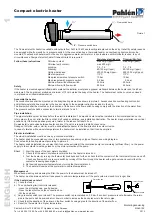
Key to symbols and safety instructions
RTG 199 ME – 6 720 811 615 (2015/04)
4
Risk of scalding at the hot water draw-off point
▶ When the water heater is in operation, temperatures in excess of
122 °F (50 °C) can occur. To limit the temperature at the tap, install
a thermostatic DHW mixing valve.
▶ Water heated for washing the laundry, dishes and for other cleaning
purposes can cause scalding and permanent injuries.
▶ Children, elderly, and handicapped persons are more likely to be
permanently injured by hot water. Never leave such individuals in the
tub or shower unattended under any circumstances. Children must
not be allowed to operate hot water faucets themselves or to fill a
bathtub.
▶ If the building has occupants in the above groups who operate hot
water faucets, or state laws / local ordinances stipulate specific
water temperatures, take the following precautions:
– Use the lowest possible temperature setting.
– To prevent scalding, install a tempering device, such as an
automatic mixing valve, at hot water tap or water heater. Select
and install the automatic mixing valve in accordance with the
valve manufacturer's recommendations and instructions.
▶ Water exiting from drain valves can be extremely hot. To avoid
injuries:
– Check that all connections are tight.
– Direct exiting water away from people.
▶ Measures must be taken to protect against excessive temperature
and pressure! Installation of a T&P safety valve is required.
To protect against corrosion and ensure compliance with the rules for
electrical safety, observe the following points:
▶ Use metal fittings for potable water heating systems with plastic
piping.
▶ Use only original accessories from the manufacturer.
▶ When installation of the water heater is complete, inspect the ground
conductor (including metal fittings).
Maintenance
Customers are advised to:
▶ Sign a maintenance and inspection contract with an authorized
contractor. Inspect and maintain the water heater as necessary and
on a yearly basis. Service as needed.
▶ Use only genuine spare parts.
Flooding
▶ After a flood, do not use the appliance if any part has been
submerged. Damage to appliances that have been submerged can be
quite severe and pose numerous safety risks.
▶ Every appliance that has been submerged must be replaced.
Summary of Contents for RTG 199 MEN
Page 55: ...RTG 199 ME 6 720 811 615 2015 04 55 Notes...
Page 56: ......





































